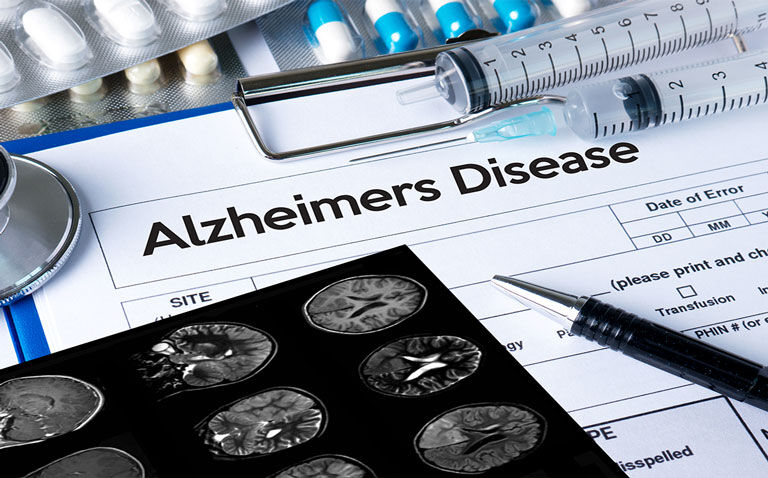Donanemab has been found to slow the progression of early symptomatic Alzheimer’s disease after 76 weeks of treatment, according to the findings of a phase 3 randomised trial.
The monoclonal antibody donanemab, which targets the insoluble, modified, N-terminal truncated form of β-amyloid present only in brain amyloid plaques, was given to patients with early symptomatic Alzheimer disease with amyloid and tau pathology. Nearly half of those given the drug showed no signs of disease progression after 12 months.
Commenting on the research, Dr Richard Oakley, associate director of research and innovation at the Alzheimer’s Society, said: ‘This is truly a turning point in the fight against Alzheimer’s and science is proving that it is possible to slow down the disease. Treatments like donanemab are the first steps towards a future where Alzheimer’s disease could be considered a long-term condition alongside diabetes or asthma.‘
Published in the Journal of the American Medical Association, participants of the TRAILBLAZER-ALZ 2 trial were categorised as having either low/medium or high tau pathology and randomised 1:1 ratio to receive donanemab or a placebo intravenously every four weeks for 72 weeks.
The primary outcome of interest was the change in integrated Alzheimer Disease Rating Scale (iADRS) score from baseline to 76 weeks. There were a number of secondary outcomes, one of which was the change in the sum of boxes of the Clinical Dementia Rating Scale (CDR-SB) score.
Donanemab and disease progression
A total of 1,736 participants (57.4% women) with a mean age of 73.0 years were recruited. Some 68.1% had low/medium tau pathology and 76% completed the trial.
The least-squares mean (LSM) change in iADRS score at 76 weeks was −10.2 with donanemab and −13.1 with placebo (difference = 2.92, p < 0.001) for the combined population. In addition, the LSM change in CDR-SB score at 76 weeks was 1.72 with donanemab and 2.42 with placebo (difference = −0.7 p <0 .001) in the combined population.
Furthermore, an estimated 47% of participants receiving donanemab had no change in the CDR-SB at one year (i.e. no disease progression) compared with 29% of participants receiving the placebo.
The trial also revealed how donanemab treatment significantly reduced brain amyloid plaque at all time points assessed, with 80% (low/medium tau population) and 76% (combined population) of participants achieving amyloid clearance at week 76.
The level of clearance beyond 76 weeks, as well as levels of Alzheimer disease biomarkers, are currently being studied in an ongoing extension phase.
In subgroup analysis, among participants with mild cognitive impairment, donanemab slowed decline by 60% on iADRS and 46% on CDR-SB. Additionally, in an analysis based on participant’s age, in those under 75 years, donanemab slowed decline by 48% on iADRS and 45% on CDR-SB, whereas the drug slowed decline by 25% on iADRS and 29% on CDR-SB in those over 75 years.
Liana Apostolova, distinguished professor in Alzheimer’s Disease research and professor in neurology, radiology, medical and molecular genetics at Indiana University School of Medicine, said: ‘These results demonstrate that diagnosing and treating people earlier in the course of Alzheimer’s disease may lead to greater clinical benefit. The delay of disease progression over the course of the trial is significant and will give people more time to do such things that are meaningful to them.‘
Dr Oakley added: ‘It’s also important to note that side effects did occur, although serious side effects only occurred in 1.6% of people receiving the drug. Regulators will need to balance these side effects against the benefits of the drug.
‘We should also note that the majority of people who took part in this trial were white – it’s crucial that in future trials we see more diversity to prove that new drug treatments have similar effects for everyone living with Alzheimer’s disease.‘
Early diagnosis imperative
Highlighting the ‘defining moment for dementia research‘, Kate Lee, Alzheimer’s Society CEO, added: ‘New treatments could mean nothing if we don’t fix dementia diagnosis. We estimate around 720,000 people in the UK could potentially benefit from these emerging new Alzheimer’s disease treatments if they’re approved for use here. But the NHS is simply not ready to deliver them.
‘Everyone living with dementia deserves access to a speedy, accurate diagnosis to get the support and treatments they need, now and in the future.‘
This comes shortly after news that diagnosing Alzheimer’s disease through the use of blood biomarkers could transform care for patients after new proposed guidelines were presented at the International Alzheimer’s Congress in Amsterdam.










